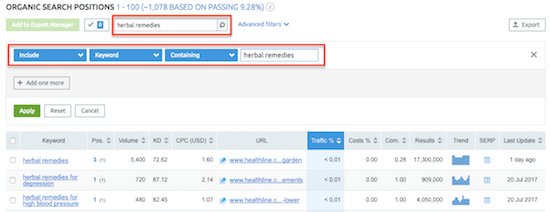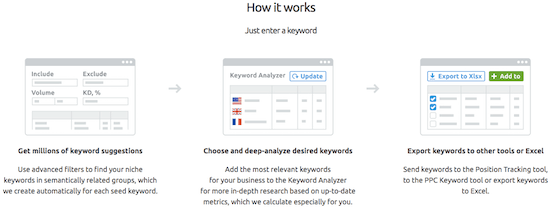SEMrush
SEMrush is an all-in-one digital marketing suite that has a number of tools that can help improve your keyword research. Seeing as experimenting with different keywords can be time- consuming, using an SEO tool like SEMrush makes the process faster and easier.
SEMrush caused a stir in the market when it launched in 2008 as it was the first competitor-based SEO tool.
Competitor research
At the beginning of using SEMrush, you can enter your domain name and it will generate a list of all competitors.

And from there, you can click each domain to start checking their keywords.
When you enter your competition domain, SEMrush returns a load of data. For instance, this is just the top part of the Domain Overview screen:

Here you can see that SEMrush has found 4,863,217 keywords that our competition domain (healthline.com) is ranking for:

SEMrush automatically sorts the results by Traffic% as these are the keywords that are likely to attract the most organic traffic. From here you can start to reverse-engineer your competitor’s best-performing keywords.
Here are the other metrics for each keyword:
- Position – Where the URL currently ranks in the SERP, and their position from the previous update.
- Volume – The estimated monthly traffic generated from these keywords (i.e. how many times people search for them).
- KD – Keyword Difficulty – the higher the number, the harder it is to rank for these keywords.
- CPC – The average Cost-Per-Click if someone advertised based on this keyword.
- URL – The web page generating the traffic.
- Traffic % – The average percentage of all traffic the website is getting from this keyword.
- Costs % – The share of total traffic cost driven to the website from the keyword over the specific time frame.
- Competitive Density of advertisers using the given term for their ads.
- Results – Number of search results in the database.
- Trend – The changes in interest for the given keyword over 12 months.
- SERP – A snapshot of the SERP source where SEMrush found the result.
- Last Update – The time when the given keyword was last updated in our database.
Filters
Using the filter, you can enter your keyword; e.g. herbal remedies, and narrow the search further:

Traditional research
If you don’t like the look of competitor-based research, then SEMrush also has a traditional research tool. This is how it works:

Keyword Magic Tool
Start by entering your keyword into the Keyword Magic Tool search bar:

SEMrush returns the results.
In the top half of the screen is an overview of your ‘seed’ keyword:

Below, SEMrush gives you a massive list of related keywords that you can break into groups by topic:

For example, you could pick ‘pain‘ from the left-hand panel and get results like herbal remedies for back pain.
You can filter these keywords by metrics like search volume, CPC, competitive density, and keyword difficulty to get your perfect list.
Keyword Analyzer
After filtering, you can send your more focused list to the Keyword Analyzer to refresh metrics on demand. In this example, I exported our pain group and refreshed the first keyword:

From here you can identify metrics like Keyword Difficulty, Click Potential and, unsurprisingly, the Top Competitors that appear on each keyword’s results page.
Other SEMrush features
- Advertising Research – Discover your competitors’ Adwords budget and keywords
- Backlinks – Monitor the quantity and quality of backlinks to your domain
- Video Advertising Research – Discover the top advertisers so you can create an effective ad campaign
- Site Audit – Find and fix your On-Page issues and boost SEO-optimization
Pricing
The SEMrush free plan limits you to a handful of searches a day. If you know what you’re looking for you can find some excellent keywords, but the results are limited. The premium plans are expensive if you’re on a tight budget, and more suited to experienced bloggers.
Prices start from $99/month or $999/year.
Pros
- Limited free plan
- Combines traditional and competitor-based keyword research methods
- Excellent competitor-based research tool
Cons
- Cluttered user interface
- The Keyword Magic Tool is in Beta phase and still catching up with other traditional research tools.
Check all the prices by clicking on the link below:

